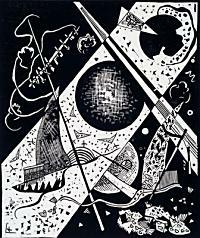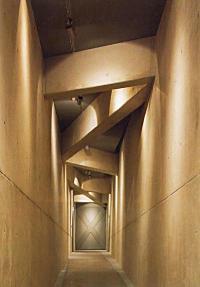|
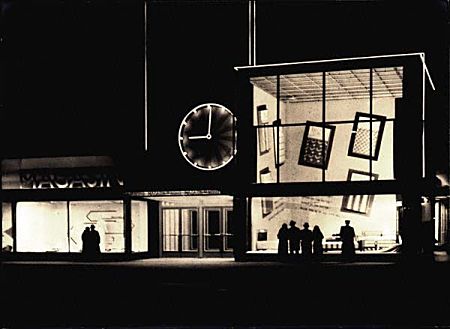
Magasin du Nord
Copenhagen
An Eye for the World
Photographs by Shotaro Shimomura
1934-1935
_______________________
But often, in the world's most crowded streets,
But often, in the din of strife,
There rises an unspeakable desire
After the knowledge of our buried life;
A thirst to spend our fire and restless force
In tracking out our true, original course;
A longing to inquire
Into the mystery of this heart which beats
So wild, so deep in us--to know
Whence our lives come and where they go.
And many a man in his own breast then delves,
But deep enough, alas! none ever mines.
And we have been on many thousand lines,
And we have shown, on each, spirit and power;
But hardly have we, for one little hour,
Been on our own line, have we been ourselves--
Hardly had skill to utter one of all
The nameless feelings that course through our breast,
But they course on for ever unexpress'd.
And long we try in vain to speak and act
Our hidden self, and what we say and do
Is eloquent, is well--but 'tis not true!
And then we will no more be rack'd
With inward striving, and demand
Of all the thousand nothings of the hour
Their stupefying power;
Ah yes, and they benumb us at our call!
- Matthew Arnold, from The Buried Life
_______________________
Safety in uniqueness, or Why the man-in-the-street has had his day
Alek Popov
eurozine
The consumer culture of the man-in-the-street has been transferred directly onto politics. He tends to shop on credit and is convinced that he can always return his purchase if it is defective or doesn't fit. This happens quite often; the dealers of power are not significantly different from used-car dealers or household goods salesmen. They sell you a quick, little war which the PR men claim will rid you of a terrible, big enemy and revive the economy. It is these same PR men which advertise the Gillette products that you have always been satisfied with. However, the war turned out to be quite a long one and dragged the economy into a profound recession. So what – it happens. Except that, when you want to get a refund on the basis of the reasonable argument that the product suffers from structural defects and is not what you borrowed the money for, you find that you can't. "Sorry, no refund policy!" So there's nothing left for you to do but to carry on with the weekly payments, and you swear that you will never buy anything from that rotten shop again. Not even a coffee maker! But then elections come along again with that same fateful inevitability. You have to fill your fridge and there's nothing can be done about it – you will go shopping again, albeit to another shop. They've got a two for the price of one deal going on. There might even be a third concealed somewhere. You'll see that when you get home and undo the packaging. Because the laws of political marketing never change.
No one can force you to buy anything you don't want to, but you can always let yourself be deceived. The man-in-the-street is easily deceived – that's why he was invented, for the convenience of the manufacturers. ...(more)
_______________________
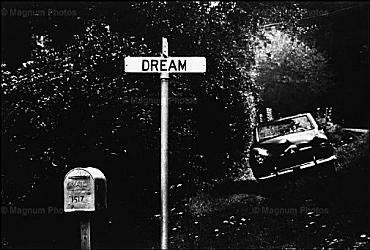
W. Eugene Smith
_______________________
The whole point of the analyses of thinkers like Derrida, Foucault and Lacan was to disrupt the philosophy of identity, given that it can have such devastating political consequences.
But the pendulum swung too far in the other direction and a fetishism of difference began to emerge. Ironically, the philosophy of difference led to a politics of identity. In different ways, Maurice Blanchot and Jean-Luc Nancy exposed the implications of this position when they argue that what we have in common is that we have nothing in common.
Forget journals!
An interview with Mark C. Taylor eurozine
EEÇ: How can we think about the relation between territory, language and identity in a post-national world without giving way to identitarian linguistic politics? What would be the communicative prerequisites for transnational, multilingual public spheres such as the ones we are working to establish?
MT: The language of the question is an echo of the past and reflects a political agenda that has not adapted to the present. Consider the terms: "post-national world", "identitarian linguistic politics", "communicative prerequisites", "transnational spheres" and "multilingualism". We know what these terms mean and readily understand their implications. But they shed no new light on what is occurring. If language is important, and it is, we must fashion a new language.
What I want to stress is that language in today's world is not primarily verbal but is, more importantly, visual. The problem is that we are visually illiterate – and nowhere is this more evident than in the university. In the "real" world, image trumps word every time; in the academic world, word represses image all the time. If communication is going to become effective on a global scale, we must liberate the image from the tyranny of the word. This does not mean giving up reading and writing as they have been known in the past. But it is no longer enough. The multilingualism of young people today is multimedia. If we do not learn to communicate in this language, we will have nothing to say....(more)
_______________________
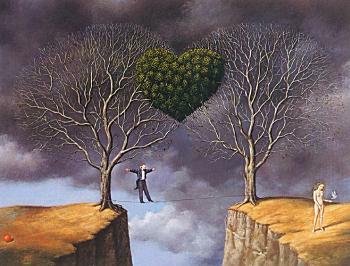 Pelleas et Melisande
Rafal Olbinski more
_______________________
Stray Lines To Toss The Year Out On Its Ear With
John Latta
The world is pretty much
Stuck with us, so I
Peek into the new Spicer “volume”
And right where he says “The fix
Has the same place in junkie-talk or real talk
It is the position
They’ve got you in,” I think of how Jennifer
Moxley’s got the word “fit” in a similarly dire
Situation and how
I point’d it out with vehemence—
What’s the etymological
Scoop behind
The word vehemence?
I’d like to think
It’s like “abominable” with a man
Hiding within, holding the nose
That turns (ab) away,
“Abhominable” is what one reads in the old
Books.
...(more)
_______________________
 The Walk to Paradise Garden
1946
W. Eugene Smith
1918-1978 1 2 3 4
_______________________
from
New Year Canticles
George Szirtes
3.
You think of your children in the early light
of the new era. You think of birds in flight.
You think of a cup in the kitchen in the broad
sunlight of mid November, of the faint noise of the road.
You think of the rhetoric of time
as a faintly bombastic ticking. You think of buds
ticking away in the branch under the rime.
The emblematic delicacy of soap suds.
4.
And the notion of an uninterrupted passage
towards happiness, the joy of the unkissed moment
waiting to fly past you, reassuringly off-message,
like a ludicrous, airborne, angelic monument,
Cupid on a bender, a sweet urgent gust
of well-being. Love among the just.
...(more)
in New & Collected Poems
_______________________
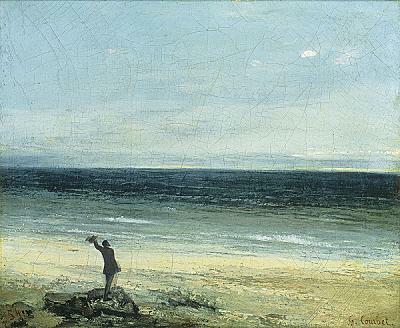
Gustave Courbet
d. Dec. 31, 1877
_______________________
Perhaps the World Ends Here
The world begins at a kitchen table. No matter what, we must eat
to live.
The gifts of earth are brought and prepared, set on the table. So it
has been since creation, and it will go on.
We chase chickens or dogs away from it. Babies teeth at the corners.
They scrape their knees under it.
It is here that children are given instructions on what it means to be
human. We make men at it, we make women.
At this table we gossip, recall enemies and the ghosts of lovers.
Our dreams drink coffee with us as they put their arms around our
children. They laugh with us at our poor falling-down selves and as
we put ourselves back together once again at the table.
This table has been a house in the rain, an umbrella in the sun.
Wars have begun and ended at this table. It is a place to hide in the
shadow of terror. A place to celebrate the terrible victory.
We have given birth on this table, and have prepared our parents for
burial here.
At this table we sing with joy, with sorrow. We pray of suffering
and remorse. We give thanks.
Perhaps the world will end here at the kitchen table, while we are laughing
and crying, eating of the last sweet bite.
-- Joy Harjo, from The Woman Who Fell From The Sky , 1994
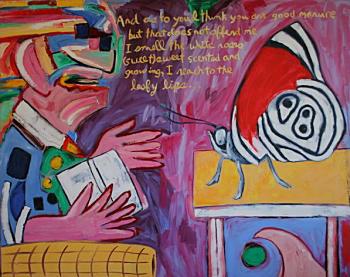 click image for full size
Man, Walt Whitman, Butterfly
Christopher Fraser
_______________________
The Lost in Translation Project, Questions for Frances Evangelista
Bud Parr
words without borders
The Lost in Translation reading challenge, created by Frances Evangelista who blogs at Nonsuchbook, is bringing together readers and bloggers to read and discuss literature in translation. There are over 50 participants and the site is full of great reading suggestions and resources for readers. We think it’s a great and interesting project and decided to ask Frances a few questions .......(more)
_______________________
from
Listening To Myself
Al Purdy
Dec. 30, 1918 - April 21, 2000
see myself staggering through deep snow
lugging blocks of wood yesterday
an old man
almost falling from bodily weakness
- look down on myself from above
then front and both sides
white hair - wrinkled face and hands
it's really not very surprising
that love spoken by my voice
should be when I am listening
ridiculous
yet there it is
a foolish old man with brain on fire
stumbling through the snow
...(more) From: Beyond Remembering - The collected poems of Al Purdy.
_______________________
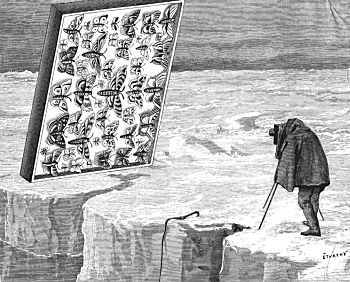 texts and images by Jindrich Štyrský
Translated from the Czech by Jed Slast
Tarpaulin Sky V4n2
XV
Dream of Butterflies
(1932 — nearly the same dream in 1937)
I’m lying on a grassy balk (in Cermná?). Suddenly I see butterflies landing on the flowers around me (cabbage whites), their tiny bodies pierced by long pins as if they had flown away from a collection. Before I could even realize it, an entire swarm suddenly flew to me and landed on my hands and face, until they completely covered me, sticking me with their pins. I woke up in pain, and also: they would have SUFFOCATED me. ...(more)
Between photograph and poem: a study of Štyrský and Heisler’s On
the Needles of these Days [PDF]
Ian Walker
Abstract
The book On the Needles of these Days was first produced by the Czech Surrealists Jindrich Štyrský and Jindrich Heisler during the Nazi occupation in 1941 and republished in 1945. Bringing together Štyrský’s photographs and Heisler’s poetry, it deserves to be better known as one of the most important of Surrealist publications combining image and text. This essay provides a close reading of a number of different aspects. The book’s design by Karel Teige produces a very finely balanced relationship between the two elements so that neither dominates the other. The connections we might create between them fluctuate between the evident and the willful, their proximity often creating layers of additional meaning. Whether the book is ultimately an impassioned call to arms or a rejection of action is open to question. Indeed, the two seem to co-exist in that dialectic of rebellion and pessimism so important to Surrealism.
_______________________
Bataille’s Project: Atheology, Non-Knowledge
Marc LaFountain
A review of: Georges Bataille, The Unfinished System of Nonknowledge, Trans. Michelle Kendall and Stuart Kendall
electronic book review
The first of Bataille's writings that the Kendalls present is his proposal for a "College of Socratic Studies." This essay highlights "slipping," one of Bataille's favorite and, I think, too frequently overlooked notions. This piece also emphasizes a number of familiar and important terms Bataille worked with over time: inner experience, expenditure, slippage, contestation, impossible, chance, the sacred, a beyond, irony, nonknowledge, isolation, communication, anguish, and method. Perhaps the Kendalls begin here because of their emphasis, developed in their introduction, that Bataille cannot be fully understood without acknowledging the degree to which he was a systematic thinker. Bataille engages and enters "the system," but unlike Rael in Peter Gabriel's The Lamb Lies Down on Broadway, who finds that "you gotta in to get out," there is no "out." Indeed one must go in, and that necessitates method. Only method opens the possibility of the impossible. But there is no getting out. Thus, unlike Surrealism or religion or philosophical systems with an "end" (e.g., structuralism, or phenomenology writ large by Hegel or small by Husserl and the French existential phenomenologists, who formed the intellectual matrix Bataille swam in), there is nothing to return to. There is an end, temporary, to isolation, which is where communication happens, but there is no out. A beyond, but no out. A beyond that is immense and proximate, and impossible. Hence contestation, and surprisingly, prayer....(more)
_______________________
A Universal History of Contingency:
Deleuze and Guattari on the History of Capitalism
Jason Read
borderlands
_______________________
A Few Books From 2008 (including Photographer of the Year...)
Tim Atherton returns.
_______________________
Islam and the West:
A Conversation with Jacques Derrida
Mustapha Cherif
2003
available at Fark Yaralari = Scars of Différance
_______________________
Blanchot at 100
video of the celebration (November 2007) at Bard College
Éric Trudel, George Quasha, Pierre Joris, Robert Kelly and Charlotte Mandell
with musical interludes (Schumann's Piano Quintet in E-flat Major and a movement (Louange à l'immortalité de Jésus) from Messiaen's Quatuor pour la fin du temps)
Thanks to Stephen Mitchelmore
_______________________
Cultural History of Emotions in Premodernity
an international workshop at Umeå University, Sweden October 23 – 26, 2008.
a report from Kristine (Serendipities)
_______________________
The 10 Worst Corporations of 2008
Robert Weissman
_______________________
... the systems by which wealth is gotten and maintained are necessary to them wherever they are in that chain, even as those systems change over time.
This sense of the rightness of things, felt as central by almost all who benefit from anything, whether law or economy or the aftermath of disaster, is the main obstacle to real progress here. It's the pavlovian bell-and-treat that keeps the momentum of things implacable, and prevents enlightened change.
This is how evil maintains the upper hand in human affairs.
- Informant38
_______________________

Jindrich Štyrský
(1899-1942)
painter, poet, editor, photographer, and collagist
Jindrich Styrsky: "On the Needles of These Days"
Photographs, 1934–1935
Ubu Gallery
_______________________
Included but not Belonging. Badiou and Rancière on Human Rights [PDF]
Ernst van den Hemel
In this article the standpoints on Human Rights by two contemporary French philosophers, Alain Badiou and Jacques Rancière are explored. Their criticalreading of the project of Human Rights moves away from the reading that we can see in the work of Hannah Arendt and Giorgio Agamben.Instead both Badiou and Rancière offer a critical version of Human Rights thatcan be subsumed under the phrase ‘included but not belonging'. Theirinterventions on Human Rights reveal, besides important similarities,significant differences. For Badiou, notions likehuman rights, and democracy, should be rejected altogether, whereas Rancièrestill sees critical potential for both the project of human rights and democracy.This difference can be attributed to the divergent notions of truth that thetwo philosophers apply. The article ends with a sketch of the critical andmilitant potential of the work of these two theorists.
Krisis Journal for contemporary philosophy
via Continental Philosophy
_______________________
Winter Solstice
Gavin Keeney
Erodiade
To all such ends, to all such mirth,
Turns Earth to ice or fiery blast.
For life is consumed in life,
And desire turns on silken feet,
Bids farewell and flies away;
No air is turned, no wing aloft,
No certain sign, no trace or pause.
Winged and gone, Love is Truth --
One knows it cannot abide time.
...(more)
_______________________

Patti Smith
b. Dec. 30, 1946
Patti Smith: Dream Of Life
writer-director, Steven Sebring
Grateful
Ours is just another skin
That simply slips away
You can rise above it
It will shed easily
It all will come out fine
I've learned it line by line
One common wire
One silver thread
All that you desire
Rolls on ahead
Like a ship in a bottle
Held up to the sun
Sails ain't going nowhere
You can count every one
Until it crashes unto the earth
And simply slips away
You can hide in the open
Or just disappear
Ours is just a craving
And a twist of the wrist
Will undo the stopper
With abrupt tenderness
Die little sparrow
And awake
Singing
It all will come out fine
I've learned it line by line
One common wire
One silver thread
All that you desire
Rolls on ahead
- Patti Smith, Gung Ho
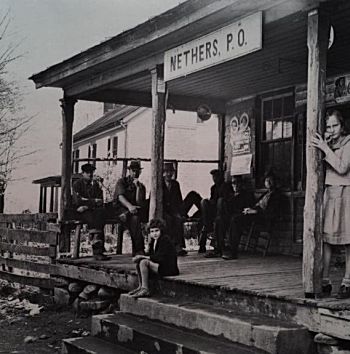 Arthur Rothstein
_______________________
Hungry for Tokensim?
Welcome to Soup Kitchen America
Richard Rhames
“By creating an image of vast, decentralized, kindhearted effort, an image that is fueled by every fund-raising letter or event, every canned goods drive, every hunger walk, run, bike, swim, or golf-a-thon, every concert or screening or play where a can of food reduces the price of admission, we allow the right wing to destroy the meager protections of the welfare state and undo the New Deal. Ironically, these public appeals have the effect of creating such comforting assurances even for those who do not contribute.”
-
Joan Poppendieck, 1998
As the holiday season slides past again, feel-good media stories of charitable giving subside. Between Thanksgiving and Christmas, the merciless lashing of consumers to buy-buy-buy is decorated with syrupy tales of donated time, money, presents, and food. For a few weeks each year, it’s fashionable to acknowledge a key issue in our atomized and structurally brutish society: Towering inequality. Jesse Jackson called it, more directly, “economic violence.”
Millions of our fellow Americans already live in poverty or dangle a paycheck, an illness, a downsizing away from chronic hunger, homelessness, or untreated malady. Meanwhile rivers of cash flow to financiers, arms merchants, venal mercenaries, and sadistic thugs we call “America’s allies” overseas.
Here, in the depths of wintery commercial riot and mall plodding, the diversionary tale loops through: Stories of some tax-deductible corporate donation, or volunteer-driven charitable meal for the “less fortunate.” Normally invisible, society’s swelling surplus/discarded laboring class makes a brief cameo appearance. People casually thrown under the economic bus, America’s disposable domestic casualties are captured in news camera lenses as grateful recipients of somebody’s charity. Then the season ends, the feverish Sell-O-Mania subsides, and the cast-offs lose their utility and their visibility for another year....(more)
_______________________
Making Poverty Visible—Three Theses [PDF]
Alexander García Düttmann
Translated by Arne De Boever
Hannah Arendt’s studies and essays on totalitarianism revealed that in the concentration camps of the National Socialists, human life reached a limit that teaches us something about the human being. Giorgio Agamben took up this insight and developed it further in his ethics of bare life. Are there indications in Arendt’s work that the human being can approach the limit of human life in other contexts as well? This essay will show that poverty also constitutes such a limit, a wall at which we experience something about the human being, about the possibility and impossibility of a public life. Parrhesia
A Journal Of Critical Philosophy
via Mike Golby _______________________
 Gee's Bend, Alabama
1937
Arthur Rothstein
1915-1985
_______________________
“Suggest Another Mechanism Of Order”:
Rachel Blau Duplessis, Torques, and the Uncertainties of Artistic Practice
Kristina Marie Darling reviews Torques: Drafts 58-76 by Rachel Blau DuPlessis
In her recent collection of poems, Torques, Rachel Blau DuPlessis reflects on both the limitations and the possibilities of language when faced with loss, a thematic approach that proves striking. Part of an ongoing long poem project in the tradition of Pound and Williams, her work takes the shape of canto-like “drafts,” a form that in itself evokes the opportunities and obstacles inherent in the writing process. Often pairing the incapacities of words with suggestions of activism through artistic practice, DuPlessis raises significant questions about the responsibilities of the poet in the twenty-first century, a role that proves at once meditative and political....(more)
Galatea Resurrects #11 (A Poetry Engagement)edited by Eileen Tabios
_______________________
the new moral seriousness
American Stranger
The moment when the twin stars of consumerism and Christianity converge seems the proper time to reflect on the intensified assault, building for years now but perhaps peaking in this one, on the conscience of the American consumer.
Though you will never hear anyone famous say this, blaming consumer capitalism on the consumer is like blaming industrial capitalism on the factory worker. Strong, independent people (in their capacity as pundits) don’t admit things like this. In our capacity as shoppers we are forced by marketers, monotheists, activists, and psychoanalysts to acknowledge that all our habits have meaning. Strong, independent people don’t allow that meaning to belong to others. ‘Our choices must reflect our values.’ The conscious consumer of today purchases organic produce, locally grown if possible, eats little to no meat, rides bicycles or takes the bus instead of driving her hybrid, practices energy conservation, avoids clothing manufactured in sweatshops, donates to nonprofits, crafts perfect counterarguments to TV news according to blogs, checks the reviews for movies before (or instead of) going to see them, and reads serious literature. Immediately to her left is the raw vegan urban farmer who buys nothing and doesn’t shower, immediately to her right is the prototypical meat-eating liberal. As Joy Williams so elegantly put it back in 2000, “concern is the new consumerism.”
This is of course not politics but morality. Much like social welfare, environmental reform has largely been left to charity and individual choice, a policy that’s had about the same level of success. Against the worst predictions of global warming the individual absolutely cannot make a difference. Even significant groups of people buying some stuff instead of other stuff amounts to little more than changing the channel — if politicians and capitalists feel it’s necessary to make major alterations in the way they do business, they will, but they vastly prefer to direct popular will toward preselected compromises (hybrid cars, Barack Obama, socially critical superhero movies, etc.). It’s an illusion that choosing these ersatz solutions is progress, that it will somehow lead to future change. Progress is whatever forced the inadequate concession to even be presented. Our identities are indeed at stake in choosing between several bad options, but unfortunately the fate of the world is not.
But this is how we’re shown the world....(more)
_______________________
 Nicholson Cartoons
.....................................................
The Spatial Instrumentality of Torture:
An Interview with Tom Hilde
By Bryan Finoki
Subtopia
In a sense, torture is beyond politics. Politics is the give and take of a collective trying to solve problems by organizing itself out of a conflicting plurality of values and goals. Torture happens by fiat, secretly, as a coercive politics carved from an ideological war against evil, which then - perhaps out of fear, perhaps out of morbid curiosity - ripples throughout other institutions of a state, demanding secrecy and moral corruption of all those involved. So do the physical spaces in which torture takes place. If we look at the spaces of torture, we see totalitarian aspirations reflected everywhere - the logic of the practice demands it. Sometimes these physical spaces are grimy; sometimes they're antiseptic. But these are simply different qualitative aspects of torture spaces designed for somewhat different goals.
_______________________
Terrorism is the madness of our times, and to understand it, we must understand the madnesses of our times.
Who Carries Out Spectacular Acts of Terrorism and Why?
Nitasha Kaul ctheory
In our times of instantaneous media transmission and reaction, offline and online lives, recorded and unrecorded deaths, we live in an interconnected synaptic world where the neural impulses of terror can create geographies of the mind. And this is what Spectacular Acts of Terrorism seek to achieve. A control over the geographies of the mind -- a desire to eliminate alternative forms of thought, expression and action. Alternatives are what fundamentalists fear -- alternatives in every form -- alternative modes of dressing, alternative notions of the sacred and of God, dissenting alternatives in political representation through democracy.
Spectacular Acts of Terrorism create Events which are designed to shift the public discourse by rupturing processes of dialogue and understanding. A Big Bang such as planes that crash into buildings, or trains that explode, or discotheques that blow up, or a rain of bullets across a city -- brings about a quantum shift in every single aspect of individual perception and public policy -- immediately. This is the deliberate outcome of such Spectacles -- they are planned to disrupt incrementalist and rational development of thought processes at every level of a pluralist functioning state and society. This is why they happen unannounced, this is why they happen simultaneously at multiple locations, and this is why they target places of public prominence.
Who carries out such Spectacular Acts?...(more)
_______________________
Torture ambivalence masquerading as moral and intellectual superiority
Glenn Greenwald
Behold the now-solidified Smart, Reasonable American Consensus on torture: the agreed-upon method for dismissing away -- mitigating and even justifying -- the fact that our leaders, more or less out in the open, instituted a systematic torture regime with the consent of our key elite institutions and a huge bulk of the American citizenry, engaging in behaviors which, for decades, we insisted were inexcusable war crimes when engaged in by others ......(more)
_______________________
Precarious Life
Judith Butler
That we can be injured, that others can be injured, that we are subject to death at the whim of another, are all reasons for both fear and grief. What is less certain, however, is whether the experiences of vulnerability and loss have to lead straightaway to military violence and retribution. There are other passages. If we are interested in arresting cycles of violence to produce less violent outcomes, it is no doubt important to ask what, politically, might be made of grief besides a cry for war.
One insight that injury affords is that there are others out there on whom my life depends, people I do not know and may never know. This fundamental dependency on anonymous others is not a condition that I can will away. No security measure will foreclose this dependency; no violent act of sovereignty will rid the world of this fact.
download here
_______________________
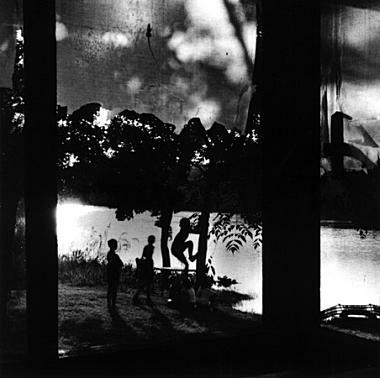
Ode to Home
Debbie Fleming Caffery
via Heading East
_______________________
Virtual Actual: Hypertext as Material Writing [PDF]
Adrian Miles
... we have witnessed and participated in the development of a writing within the humanities that has generally divorced itself from the materialities of the thinking of thinking within language as a material medium. A productive way to instantiate this materiality and to situate it within practice is via the materiality of a genuinely digital writing practice.
Studies in Material Thinking
_______________________
an interview with helen dewitt
author of The Last Samurai and
Your Name Here
Dan Visel
if:book
The machinery of the publishing industry means that there's a very long gap between the point where the author crossed the finish line, moved on to other books, and starting working on something new and exciting, and the point where the book is acquired by an editor and starts the long journey into print. So if you publish a book you have to go back and eat your own vomit. Then the physical object is available for sale, you're expected to give interviews and go out and tell everyone how nice it tastes. Which means the book(s) you're actually excited about are ripped out of your head; you go back to the fragments on paper, and you see that this looked like a great book, but the person who could have finished it no longer exists, so you feel pretty sick.
Publishing online is more like taking a book to Kinko's. If I take a MS to Kinko's to copy, I don't need to know anything about the intellectual strengths of the repro op: the copy will have only the mistakes that were there when I walked in. That's not to say it won't have any mistakes – but there's no way in the world that hundreds of alterations will creep into the text behind my back. So I can copy it and give it to friends and forget about it; this doesn't get in the way of thinking about other books. There's absolutely no reason why the occasional trip to Kinko's should stop me from writing 10 books a year.
The difference becomes really obvious when you have a book that's technically difficult....(more)
Thanks to language hat for the pointer in this direction. Helen blogs at Paperpools
_______________________

Jim Pomeroy
stand-up theorist
(1945-1992)
Pomeroy was both a self-proclaimed "militant pessimist" and the 'militant populist.' He fused the theatre of montage with the "toys" of technology. His weapons were puns, irony, farce, countermastery and fun; his medium was a fusion of sound, performance, video, writing, and installation; his tools were the debris of culture-gasoline cans, plastic Godzillas, inflatable globes, Bunsen burners. monopoly tokens, stereoscopes, and Spuds McKensey. Circulating amidst this repertoire of parodic paraphernalia, the performing body of the jester inserted himself into techno-ohjectivity.
-
Timothy Druckrey and Nadine Lemmon, "Theater of Operations," For a Burning World Is Come to Dance Inane: Essays by and About Jim Pomeroy, Critical Press, 1993.
from a longer quote provided by Jeff Ward
The Boy Mechanic
Mechanical Personae in the works of Jim Pomeroy
Paul DeMarinis
The Avenger
Akira Mizuta Lippit reviews a Pomeroy retrospective
Afterimage, Sept, 1999
_______________________
habitus extinct
blah-feme
This is the double bind of the new empirical man-object: on the one hand it is ‘thickened’ by its detailed taxonomical capture in the empirical discourses; on the other, it thereby loses its invisible, relatively unchallenged, status as silent bearer of discourse.
A ubiquitous response to this double bind was to deliberately appropriate more self-consciously atavistic discursive markers of masculinity – markers which had seemed, until the medicalisation of men that marked the fin de siècle, to operate without impediment, to operate as salient and powerful assurances of man’s power before his constitution as patient and case study. These atavistic markers – amongst which we might include textual authority, physical strength, uprightness, moral and intellectual superiority and a firm grasp of the public arena – seemed, in the fin de siècle imagination, to call up a golden age of Arcadian masculinity: undoubtedly, what characterises the operation of hegemonic masculinity at the fin de siècle is thus a kind of gender nostalgia. (....)
The operation of gender hegemony thus operates here like this: the fear of what lies outside is what holds men inside, keeps them safely at bay and insists on their allegiance to a simple but powerful creed: stand upright, be steadfast to the principles of inscrutable masculinity, hold onto your Herrschaft for dear life and watch out for those deadly sirens that will turn you any moment, calling calling, calling.
To refuse that hegemony, it seems, is to painfully twist and turn in the way of the underworld: come down with me, into the depths, into that place where Freud saw Lüger, in the darkest and most terrifying underplaces where we can tarry with the monsters....(more)
_______________________
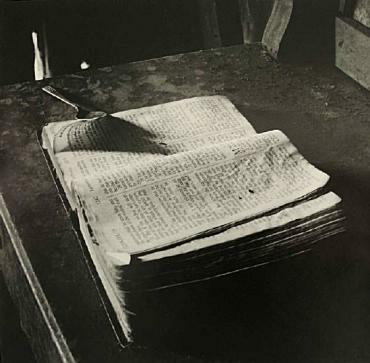
Lamentations for Princes
Debbie Fleming Caffery

Mazurin
1900s
Quiet Resistance
Russian Pictorial Photography
1900–1930s
Moscow House of Photography
_______________________
Madness.
“mad”ness comes from the foul epoch.
The aunt is mad at me.
the uncle comes home late.
The children are mad.
The dog is mad.
The housewife is mad at you—
The door is barred.
The ship is sunk, the crew
is mad. Ernst Herbeck
Translated by Gary Sullivan and Oya Ataman.
_______________________
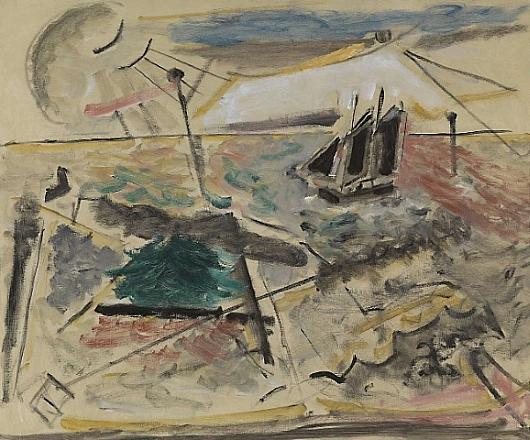
Seascape Fantasy
Maine
John Marin
1870 - 1953)
_______________________
The Snow Cave
Robert Gibbons
Monday, December 22, 2008
Eavesdropping on this massive silence, inside & out, assembled by snow suddenly stopping without notice. The near world withdraws, stars draw close. Cold in here before four in the morning, but I don't mind. Companion, silence. Mood, silence. Corporeal, musical, now visual, dark silence. Trance, an offering. Writing itself out. Reaching early memories without specifics, a tone, a fondness. Shrill silence of guilt & regret, kept at bay. Who ever expected Time this promising? The quieted heart sprawled out in Love within a sanctuary of silence.
_______________________
Lisa Robertson
PhillyTalks #17 (Oct. 3rd, 2000)
To language, rain. To rain, building. Think of this stricture so that the vernaculars of causation quicken. To Claude, his contemplation. To objects, passing. To golden change our own blazing device. The day follows the present. Half and then half, delectable and idle, with gleams of fine greenery in the intervals. To the middle of instability, no absolution dad. To the end of surfaces, our mistake.(....)
The first procrastination, dark and sultry; the latter part merely dirty, with heavy lines. Some tufts are caught in the previously bare limbs, tufts of a genus, a heighth and a name. It is a movement as the disburdening of the face. How are we to unlearn each thing?(....)
December seeks a runnel. A runnel. A limb. A sky. A disburdening. A heighth. A name. A rubbing. A fear. A thing. A fear. A tuft. A face. A runnel. An escape. So that sometimes we want an atmosphere like to harden us or garnish. Sometimes we need an atmosphere.
_______________________
The Device
Lisa Robertson
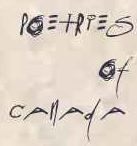
Poetries of Canada
The East Village Poetry Web
A Special EditionEdited by Jack Kimball & David Bromige
_______________________
Wooden Houses
Lisa Robertson
jacket 27
The Apothecary
Lisa Robertson
google books
Occasional Work and Seven Walks from the Office for Soft Architecture
by Lisa Robertson
Coach House Books
Reviewedby Rachel Johndrow
seven oaks Lisa Robertson lived in Vancouver for twenty-three years and saw the surfaces and architectures of the landscape change drastically. These collection of works are an ethical attempt on her part to “question [her] own nostalgia” for decay, but rather than a brandishing tone, these essays present ever-changing spaces with a loving regard. “I tried to recall spaces, and what I remembered was surfaces.” And so she has softened the edges of ‘space’, that boxy and somewhat contentious void. Moreover, she maintains a common thread in these essays touching on the fear of our own dissolve, the slippage of our history and legacy, our tendency to become frightened and overwhelmed at maintaining the willful ignorance that time really is passing – for us.
Robertson’s criticality is soft, just like “memory’s architecture”. Her manifesto suggests she reaches for no utopia, yet for every thing that wants to be, and in that she has succeeded well. This book gives us many pauses to think about the changing city, and the complicated aspects of what was then, is now, and why it is we hang on. Gentle steering starts and stops amid this light agenda, and we begin to think about our own touchings of skin in the city. The Office for Soft Architecture is a timely and lasting collection that continues to make us think and re-think our own little theories, and the surfaces we inevitably create....(more)
_______________________
from
The Office for Soft Architecture
Lisa Robertson
drunken boat
Seventh Walk
We had been at our physical exercises. Now we entered into the late civic afternoon. The scissoring metres of the apparatus had left us lucid, distant, and extreme. Cool air parsed our acuity. Although we indeed sauntered in the street, through the grey discourse called human and concatenations of rain (in short, in the mode of the ordinary), my guide and I perceived as from a vast temporal distance an impertinently muttering tide of ambitions and ticks. It was our city. We recognized the frayed connective cables sketched by words like ‘went’ and ‘pass,’ the sacral nostalgias fueling violence and the desiring apparatus of love. Utopia was what punctuated the hum of disparities. Utopia; a searing, futuristic retinal trope that oddly offered an intelligibility to the present. We saw that we could lift it and use it like a lens. We observed guys in their cities, guys in their cities and their deaths and their little deaths and mostly what we coveted was their sartorial reserve, so marvelously useful for our purpose. “The fact remains that we are foreigners on the inside” opined my guide; “but there is no outside.” And it was true that inside any “now” there was the syllable by syllable invention and the necessity for the disappearance of faces and names. Therefore we wanted only to document the present. For example, women—what were they? Arrows or luncheons, a defenestration, a burning frame, the great stiff coat with its glossy folds, limbs, inner Spains. . . Our hands forgot nothing. We searched for these pure positions to frame with our lens. Our foreignness was a precisely burdensome gift.(....)
We began to imagine that we were several, even many. In the guise of several we lounged dissolute on nonce-coloured couches, bold in conscious merit. What we were to ourselves: fabulously dangerous. We never performed the pirouette of privation. Dangerously we pulled our kneesocks up over our knees. We asked the first question and we answered. What is earth?—A haunt. A tuft. A garland. An empress. A mockery. Girlfriend. A violet. A milk. A cream. A hazardous trinket. A flask. A basket. A mimic. A wild ideal paggeant in the middle of London. A plinth. A liking. A bachelor. A thickening. A military straggling. And the severance, utter. And so on.(....)
But now we needed to abandon our pastime. My guide and I found ourselves leaning into the transition to night. Everything had a blueness, or to be more precise, every object and surface invented its corresponding blueness. And the trees of the park became mystical, and we permitted ourselves to use this shabby word because we were slightly fatigued from our exercises and our amusements and because against the deepening sky we watched the blue-green green-gold golden black-gold silver-green green-white iron-green scarlet tipped foliage turn black. No birds now; just the soft motors stroking the night. Stillness. We went to our tree. It was time for the study of the paradox called lust. Our chests burst hugely upwards to alight in the branches, instrumental and lovely, normal and new. It was time for the lyric fallen back into teeming branches or against the solid trunk gasping...(more)
Readings from the Office for Soft ArchitectureLisa Robertson audio
_______________________
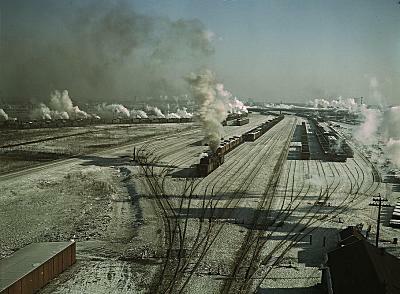
Chicago
Jack Delano
1942
_______________________
Expansion at a Time of Great Leavings
Deb Scott
qarrtsiluni
“If time has to end, it can be described, instant by instant,” Mr. Palomar thinks, “and each instant, when described, expands so that its end can no longer be seen.”
- from “Learning to be Dead”, in Mr. Palomar by Italo Calvino.
“They got it wrong, this time.” She sighs and looks for tell-tale furrows, leaving the thought undone. That happens more and more. Each day her urges mature, exponentially. She ponders Derrida’s philosophy, dreams of peach gelato and recalls the fading blue of glacier ice. All the while her skin smoothes, blemishes fade, wrinkles flatten against tightening skin....(more)
qarrtsiluni
an experiment in online literary and artistic collaboration _______________________
"Quotations are useful in periods of ignorance or obscurantist beliefs."
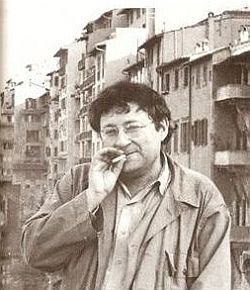
Guy Debord
b. Dec. 28, 1931
Debord in Florence (1972)
"This society which eliminates geographical distance reproduces distance internally as spectacular separation."
The Society of the Spectacle
Guy Debord
translation by Ken Knabb
Situationist International Anthology
Edited and translated from the French by Ken Knabb
Bureau of Public Secrets
The Situationist International Text Library
_______________________
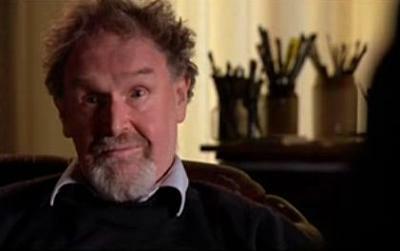
Alasdair Gray
b. 28 December 1934 0 - 70
a selective tour of
Alasdair Gray
Kevin Cameron
(BBC Scotland)
Alasdair Gray: An Introduction
Will Self
Lanark 1982:
an unofficial Alasdair Gray website
Unlikely Murals ... Mostly
A 25 minute documentary about the mural work of Scottish artist and writer Alasdair Gray.
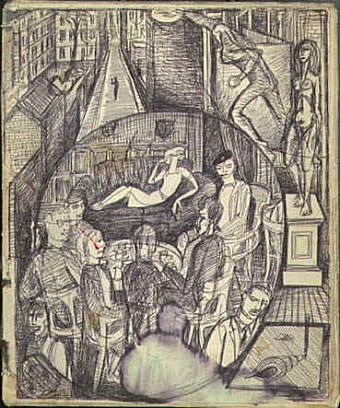
Drawing of the Elite café
Drafts and papers of Lanark:
A life in four books
Alasdair Gray
Glasgow University Library
_______________________

Harold Pinter
10 October 1930 – 24 December 2008
photo - Pinter in Krapp's Last Tape
Royal Court Theatre
October 2006
Art, Truth & Politics
Harold Pinter
Nobel Lecture
In 1958 I wrote the following:
'There are no hard distinctions between what is real and what is unreal, nor between what is true and what is false. A thing is not necessarily either true or false; it can be both true and false.'
I believe that these assertions still make sense and do still apply to the exploration of reality through art. So as a writer I stand by them but as a citizen I cannot. As a citizen I must ask: What is true? What is false?
_______________________

Gracie #1
Angela West 1 2
_______________________
How to Colour
Lisa Robertson
Tarpaulin Sky V4n2
We can’t always tell the difference between sentiment and emotion. They marble. The fungal puce bordering the sweating window pane, the flapping cobalt tarp on the leaking condo, the intense turquoise of low-rent trim in our neighbourhood: the surface of the city indexes conditions of contamination, accident, and subordination. We always dream in colour: This is part of the history of surfaces.
When Walter Benjamin visited the house of Goethe in a dream, the corridor was whitewashed. We’ll stroll down that pale hallway, and apply to its purity a narrative maquillage....(more)
_______________________
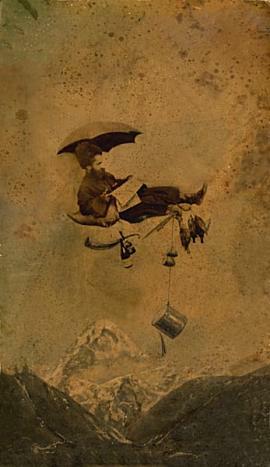
Vasil Roinashvili
1912
_______________________
Nothing but the World
Jean-Luc Nancy
An Interview with Vacarme
Rethinking Marxism, Volume 19, Issue 4 October 2007
If we can confirm the unfeasibility of a certain philosophical oversight of the political (an unfeasibility whose different aspects you deal with in detail), this in no way means we are witnessing a simple exhaustion or closure, if by closure we mean a closing off, a dead end or impasse. If there is indeed "closure," it has the same sense and the same logic as the "closure of metaphysics" (an expression Derrida once used that repeats Heidegger's "end of metaphysics" while activating a different set of terms; both expressions have and still give rise to the worst misunderstandings, especially on the part of those who don't want to understand). From the very beginning, then, we are situated in the midst of an enormous question or, better, in the middle of a configuration of thought that is entirely on the move and surrounds us on all sides. "Closure" and "end" therefore mean: a shift in history. We are in the midst of a shift, of a change comparable to that marking the passage from antiquity to the modern world (to give a concrete image, let's say sometime between the ninth and eleventh centuries). This culture's entire order of dominant significations has been suspended, and remains so: at the outset, such a suspension can only seem like a loss. But it's just as much a beginning. Concerning the political, what has been suspended is nothing less than the philosophical foundation of the political itself.(....)
People often say I'm too "optimistic." Not at all. But that doesn't mean I'm a pessimist. Both of these postures are based on anticipations. All I ask is that we tenaciously stick to the present and not abandon it for some hazy horizon. Stick to the present of this world and to what is "awkward" about it. There is an age called "awkward" where a number of important issues converge and are put into play for a young person. We are very young, very restless, very lost - but not completely so. I believe in particular that right now a profound movement is taking place, a continental drift of sense or thought, between the thoughts of yesterday and those still to come, between those of the old West and those coming from the diverse elsewheres that are no longer elsewhere, and it is there that we discover plenty of tasks for thought. I obstinately keep coming back to this: there is nothing disincarnate or "apolitical" about this "intellectual" work. It's a great deal more than producing a series of political propositions. This work, or this worker, you, me, has his or her arms elbow deep in a pulp of representations, orientations, calls, and echoes, in a trituration and separating out of a common thinking matter, a work that is not only important for our mobility but is our very mobilization. So it is, moreover, with our interview. I'll stop with this seemingly calculated close. It is, of course, entirely provisional.
You can read the full piece here (free registration required),
_______________________

Jack Whinery
Pie Town, New Mexico
Russell Lee
1940
1930s-40s in Color
Library of Congress Flickr pilot
a midwinter / solstice garland
_______________________
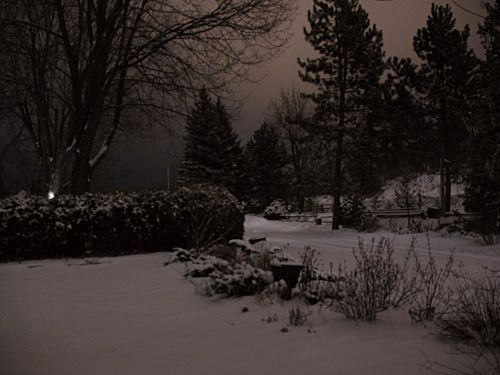
photo - mw
_______________________
The snowfall is so silent,
so slow,
bit by bit, with delicacy
it settles down on the earth
and covers over the fields.
The silent snow comes down
white and weightless;
snowfall makes no noise,
falls as forgetting falls,
flake after flake.
It covers the fields gently
while frost attacks them
with its sudden flashes of white;
covers everything with its pure
and silent covering;
not one thing on the ground
anywhere escapes it.
And wherever it falls it stays,
content and gay,
for snow does not slip off
as rain does,
but it stays and sinks in.
The flakes are skyflowers,
pale lilies from the clouds,
that wither on earth.
They come down blossoming
but then so quickly
they are gone;
they bloom only on the peak,
above the mountains,
and make the earth feel heavier
when they die inside.
Snow, delicate snow,
that falls with such lightness
on the head,
on the feelings,
come and cover over the sadness
that lies always in my reason.
Miguel de Unamuno
Translated by Robert Bly
_______________________
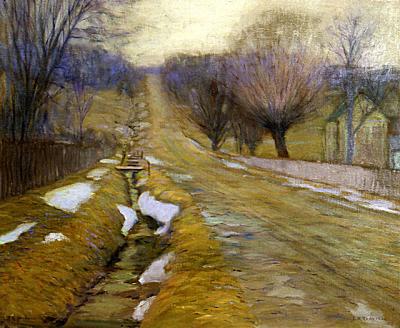 Bucks County Winter
Edward Willis Redfield
1869 - 1965
_______________________
"Inverting the Panopticon: Money and the Nationalization of the Future"
Gustav Peeble
Public Culture 20:2 (2008)
pdf download
All the stupidity and the arbitrariness of the laws, all the pain of the initiations, the whole perverse apparatus of repression and education, the red-hot irons, and the atrocious procedures have only this meaning: to breed man, to mark him in his flesh, to render him capable of alliance, to form him within the debtor-creditor relation, which on both sides turns out to be a matter of memory — a memory straining toward the future.
-
Gilles Deleuze and Félix Guattari, “Savages, Barbarians, Civilized Men,” in Anti-Oedipus: Capitalism and Schizophrenia
... national money is the gradual result of successive open and agreed-upon contracts between citizens, states, and banks, rather than exclusively the result of systemic changes dictated from the top down. Following this long developmental process starkly reveals the way in which the state comes to control semiotic processes, in effect, appropriating an international sign of value held by its citizenry (e.g., gold or silver) and replacing it with a national sign of value (paper or token coins). This exchange of international and national signs, then, carries important consequences for binding the citizens to the nation-state. Whereas most studies of nationalism contribute to our understanding of how citizens became tied to a convergent and produced national past, the history of the emergence of national paper money will show that it is equally important to consider the manner in which people became bound, in unison, to the nation-state’s future.
In so binding the citizenry to the nation’s future, this paper money system in turn contributes to the production of the spatiotemporal boundaries that mark the nation-state. In effect, it creates a sort of inverted panopticon, wherein the citizens must be constantly gazing back into the nation’s center, for their own economic self-interest has now become attached to the management of the national currency.
_______________________
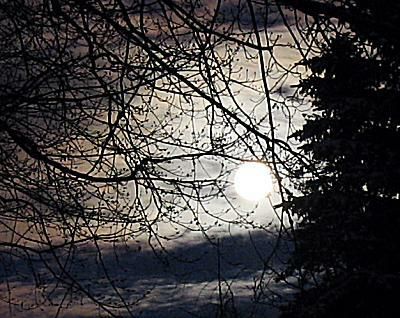
photo - mw
_______________________
One must have a mind of winter
To regard the frost and the boughs
Of the pine-trees crusted with snow;
And have been cold a long time
To behold the junipers shagged with ice,
The spruces rough in the distant glitter
Of the January sun; and not to think
Of any misery in the sound of the wind,
In the sound of a few leaves,
Which is the sound of the land
Full of the same wind
That is blowing in the same bare place
For the listener, who listens in the snow,
And, nothing himself, beholds
Nothing that is not there and the nothing that is.
- Wallace Stevens, The Snow Man
_______________________

photo - mw
_______________________
th wintr peopul
ar responding 2 th green hous effekt evree
few yeers they find it 2 warm n go furthr
north 4 comfort toronto is now 2 cozee 4
them th sault n thundr bay r far 2 summree
they feel th warmth 2 b frivolous it makes
them un eezee 7 yeers ago aftr having found
nu liskeard 2 mediterranean th wintr peopul
discovr church hill falls 2 b mor balmee thn
they wud want n ar hedding tord th artik
circul evn ther they bcame restless th artik
was warming up if it heets up evree wher
wher will th wintr peopul go full uv needs 4
snow n icikul pellets flying in th freezing rain
n snow hills n mountains mooving around th
elk n polar bears th sun glayzlng on th ice
fields th hallucinating cold n steem from
theyr wishes 4 th souls fire not distraktid by
anee gud wethr
Bill Bissett
_______________________
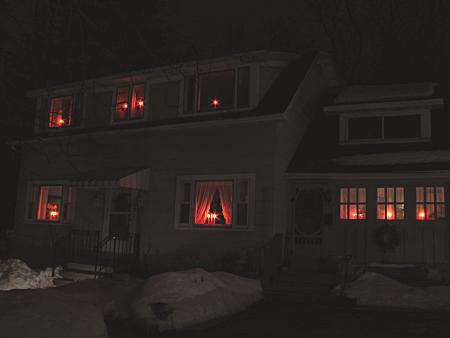
photo - mw
_______________________
I shall return in a few days.
For the nonce, take what seasonal pleasures may be had and be kind to yourselves and one another - mw.
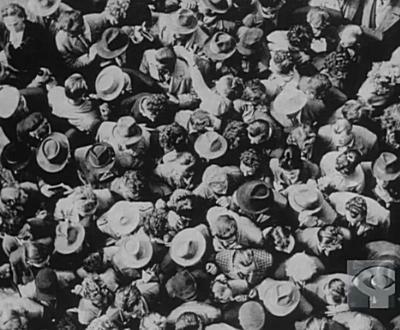
Very Nice, Very Nice
Arthur Lipsett
1961
6 min 59 s
National Film Board of Canada
via Horses Think
Arthur Lipsett was an artist in the animation studio who eventually started making live action films – but live action with a difference. The sensibility is that of an animator – cut with extraordinary precision, not one frame too long or too short. Very Nice, Very Nice is composed with still images and is a wickedly funny and terrifying examination of modern life. When teaching in Norway in recent years, I always showed it to my film students. Its impact was tangible. Although made in 1961, it has not dated at all. Lipsett was a true original, and much of the sound and imagery for his films was found in the trim bins of the NFB. Trim bins were the receptacles where one put one’s outtakes. Following Grierson’s dictum, Lipsett found the extraordinary in the ordinary. - Donald McWilliams
_______________________

Martin Glaberman
(Dec. 13, 1918 – Dec. 17, 2001)
Revolutionary Optimist
An interview with Martin Glaberman
Martin Glaberman Archives 1 2
The Working Class and Social Change
Martin Glaberman
The reality of blue collar work, factory work, or even white collar work, is somewhat different than the various other forms of alienation which exist in this society But there is another element involved.
There has clearly been a change in the classic middle class in modern society. The middle class used to be a self-employed middle class, the independent farmer, the independent professional, and so on. The bulk of that has disappeared and has become transformed into a salaried middle class, which performs similar, and, sometimes, not so similar, functions, but essentially functions of social control.
An important distinction between teachers or social workers and manual workers is that workers manipulate things and teachers and social workers manipulate people. And although they are exploited and underpaid and should unionize and strike, they perform certain functions of control in this society which cannot be ignored by simply defining them as working class. If that distinction is lost, then a very important distinction that relates to various tactical and strategic questions is lost. if you define everybody that is getting low pay (and many teachers get less than many workers; there are tool and die makers that make much more than grade school teachers) then, unless you go back to a definition in terms of income, that does not change the reality of one being essentially middle class and the other being essentially working class. Both have reason to resist and revolt against this society. There is no social revolution in the modern world that I know of that can take place with simply the working class....(more)
_______________________

Very Nice, Very Nice
Arthur Lipsett _______________________
Notes on 'Capitalism as Religion'
No Useless Leniency
'capitalism is a purely cultic religion, perhaps the most extreme that ever existed'
- Benjamin
There are no "weekdays." There is no day that is not a feast day, in the terrible sense that all its sacred pomp is unfolded before us; each day commands the utter fealty of each worshipper."
Rather than the usual model of capital as abolishing or rationalising the sacred - making everyday a workday - Benjamin reverses this to argue that everyday is the feast day. What capitalism imposes is this unremitting requirement for its own worship without mercy. I'm reminded of Blanchot's quip that we have prisons to try to remind us that we are not all living in a prison (although whether Blanchot spent any time in a US supermax prison I can't say). Capital's lack of particular festivals / churches / places of worship makes everywhere a place and time of worship....(more)
_______________________
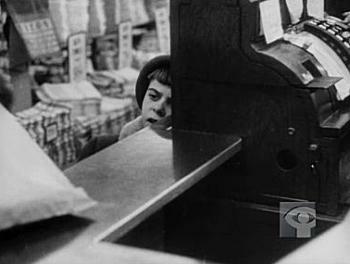
Very Nice, Very Nice
Arthur Lipsett _______________________
Money: Wasted Billions, Lost Lives and Corporate Greed in Iraq
An unpublished federal report has concluded the US reconstruction effort in Iraq has been a $100 billion failure. It found that the rebuilding has not done much more than restore what was destroyed during the invasion and the looting that followed. We speak to journalist T. Christian Miller of the investigative website ProPublica, who obtained a copy of the report.
democracy now
I think there is a common theme, both to—that runs from Madoff to the subprime crisis to the reconstruction of Iraq, and that is accountability, that is government regulation, and that has been decimated. Beginning in the 1990s and after the Cold War, you’ve seen those agencies in the American government, which were responsible for regulation, agencies like the GAO, contacting agencies, oversight agencies, have just been devastated by cutbacks, by administrations which have not paid that much attention or provided them with the staffing or personnel they need to do their jobs. So you have seen, I think—through all these different crises, what you see is, the government wasn’t there at a time when it was supposed to be there.
There are different reasons in all those cases. In Iraq, certainly there was a lot of violence. Certainly, it was difficult to get people to go over to Iraq and pay attention. With Madoff, we’ll see what the Securities and Exchange Commission has to say about why they weren’t adequately regulating that issue. But time and again, the issue is, we’ve had a government which has been really shrunk and hollowed out in terms of its ability to oversee and regulate private businesses, private corporations and what it is they’re doing. And that is the function of government, is to make sure that everybody plays fair. They’re referees. And if there’s not enough referees around, the game gets ugly. ...(more)
via Tom Matrullo
_______________________
Cost of the Wars in Iraq and Afghanistan, and Other Military Operations Through 2008 and Beyond
Center for Strategic and Budgetary Assessments
PDF
_______________________
The Logic of Keynes in Today's World
Robert Reich
The current recession is a nightmare for people who have lost their jobs, homes, and savings; and it’s part of a continuing nightmare for the poor. That’s why we have to do all we can to get the economy back on track. But most other Americans are now discovering they can exist surprisingly well buying fewer of the things they never really needed to begin with.
What we most lack, or are in danger of losing, are the things we use in common – clean air, clean water, public parks, good schools, and public transportation, as well as social safety nets to catch those of us who fall. Common goods like these don’t necessarily use up scarce resources; often, they conserve and protect them.
Yet they have been declining for many years. Some have been broken up and sold as more expensive private goods, especially for the well-to do – bottled water, private schools, security guards, and health clubs, for example. Others, like clean air, have fallen prey to deregulation. Others have been wacked by budget axes; the current recession is forcing states and locales to axe even more. Still others, such as universal health care and pre-schools, never fully emerged to begin with.
Where does this logic lead? ...(more)
via mirabile dictu
_______________________
As Madoff Scandal Wipes Out Charities and Foundations,
SEC Admits it Missed Repeated Warnings on Historic $50B Financial Fraud
_______________________

Angelus Novus
(1932)
Paul Klee
b. Dec 1879
This is how one pictures the angel of history. His face is turned toward the past. Where we perceive a chain of events, he sees one single catastrophe which keeps piling wreckage upon wreckage and hurls it in front of his feet. The angel would like to stay, awaken the dead, and make whole what has been smashed. But a storm is blowing from Paradise; it has got caught in his wings with such violence that the angel can no longer close them. This storm irresistibly propels him into the future to which his back is turned, while the pile of debris before him grows skyward. This storm is what we call progress.
- Walter Benjamin, "On the Concept of History"
_______________________
excerpts from as yet unpublished works
Charlotte Mandell
Tomb of Ibn Arabi
Abdelwahab Meddeb
Translated by Charlotte Mandell
I
Ruins, remember, neglected grounds, dust, wanderers’ refuge, the voice blends with its echo, look at the man in the cave, the rock is a mirror, everything is deserted, I wait for the clouds to shed their tears, I wait for the flowers to speak, I call out, no one answers, the stone hears my excitement, how many moons thrown in the well, how many suns come out of oblivion, the tree touches the sky, and the spark spells out a star, lightning flashes a carpet in the shadows, on the headlands in the south, winds brush against the thunder, on the path, I say a rosary of pearls, black camels double the mounts and hills, sand covers my tracks in the dunes, seers wandering in the shade of gardens, the summer heat is a woman’s smile that unearths the custom of the dolls, so many vague paths, oh memory, oh mystery, the light appears fleeting, inside the heart an ancient feeling is engraved, that separates.
II
With what words to say, in what bush to set foot, in peace, in danger, overwhelmed with love, to run back in one’s tracks.
...(more)
excerpts from as yet unpublished works
Charlotte Mandell
_______________________
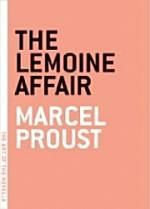
The Lemoine Affair
Marcel Proust
translated by Charlotte Mandell
(Melville House)
part of Melville House’s Art of the Novella series Best Translated Book 2008 Longlist
Three Percent
Charlotte Mandell interviewed at Three Percent
CM: Rabelais was the first author I know of to write pastiches—The Third Book of the Pantagruel features a lot of pastiches written in the style of authors of his day. Alexander Pope, who spent years translating (or sub-contracting) Homer, did our most famous pastiche of the epic form in The Rape of the Lock. Henry Fielding’s Shamela is a much shorter parody and pastiche of Samuel Richardson’s commercially successful but interminable Pamela. Mark Twain has the Duke do a hilarious Shakespearian pastiche in Huckleberry Finn. La Bruyère pastiched Montaigne, I think. Max Beerbohm parodies different literary styles (H.G. Wells, Rudyard Kipling, Henry James, Joseph Conrad, and many others) in A Christmas Garland. The French author Paul Reboux, in collaboration with his friend Charles Müller, wrote many volumes of pastiches, titled A la manière de . . .; Proust is pastiched in it, along with his friends Alphonse Daudet and Anna de Noailles, as well as Tolstoy, Arthur Conan Doyle, Sartre, Jean Jaurès, Mallarmé . . .
It’s interesting you mention Oulipo – Raymond Queneau’s wonderful Exercices de style is a form of pastiche, since it tells the same story in 99 different styles (Umberto Eco translated that into Italian). That work spawned a number of other pastiches: Stéphane Tufféry’s Le style, mode d’emploi, in which he pastiches Balzac, Hugo, Verne, and Flaubert, among others; Lucien d’Azay’s Nouveaux exercices de style, in which he pastiches Duras, Echenoz, and Le Clézio, to name just a few; and the Oulipian Hervé Le Tellier, who presents 100 different views of the Mona Lisa in his Joconde jusqu’à cent, then 100 more in Joconde sur votre indulgence....(more)
Charlotte Mandell's web pages
Charlotte Mandell Interview
ReadySteadyBook
Translation as Breathing New Life in a New Language:
Conversing with Charlotte Mandell
Greta Aart
Emprise Review
The Book to Come
Maurice Blanchot
translated by Charlotte Mandell
Google Books
The Work of Fire
Maurice Blanchot
translated by Charlotte Mandell
Google Books
A Voice from Elsewhere
Maurice Blanchot
translated by Charlotte Mandell
Google Books
The Flesh of Words: The Politics of Writing
Jacques Rancière
translated by Charlotte Mandell
Google Books
Fragments of the Artwork
Jean Genet
translated by Charlotte Mandell
Google Books
_______________________

Twittering Machine
1922
Paul Klee
b. Dec 1879
_______________________
Glimpse: The Art & Science of Seeing
Glimpse is an interdisciplinary journal that examines the functions, processes, and effects of vision and vision's implications for being, knowing, and constructing our world(s). Each theme-focused journal issue features articles, visual spreads, interviews, and reviews spanning the physical sciences, social sciences, arts and humanities.
issue one - "Is the visual political?"
via Jim Johnson
_______________________
John Milton’s vision
Theo Hobson
If we are to honour Milton on his 400th birthday we must clearly recognise the persistence of his otherness - the fact that he cannot be claimed as a noble exemplar of the national soul. The nation chose against him, and still does.
It is far more accurate to say that Milton was a key founder of the American liberal tradition, than of the British one. This is not just because of his republicanism: even more important to him than republicanism was his aversion to religious establishment. During the interregnum (1649-60) he worried that England's revolution was uncertain until Oliver Cromwell had clearly separated church and state, and instituted an explicitly secular liberal state (which Cromwell never quite did). This was the ideological obsession of Milton's life.
So if Milton were to revisit us today he would not rejoice at the progress of liberty since his death. He would be depressed to see that the country of his birth retains a monarchy, and even more so an established church. ...(more)
via Maud Newton _______________________
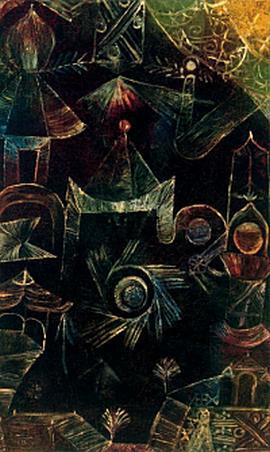
Cosmic Architecture
Paul Klee
1919
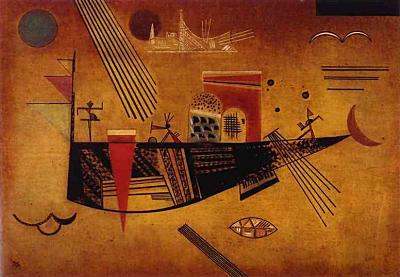
Capricious
Wassily Kandinsky
1930
_______________________
Sojourns in the Parallel World
Denise Levertov
We live our lives of human passions,
cruelties, dreams, concepts,
crimes and the exercise of virtue
in and beside a world devoid
of our preoccupations, free
from apprehension--though affected,
certainly, by our actions. A world
parallel to our own though overlapping.
We call it "Nature"; only reluctantly
admitting ourselves to be "Nature" too.
Whenever we lose track of our own obsessions,
our self-concerns, because we drift for a minute,
an hour even, of pure (almost pure)
response to that insouciant life:
cloud, bird, fox, the flow of light, the dancing
pilgrimage of water, vast stillness
of spellbound ephemerae on a lit windowpane,
animal voices, mineral hum, wind
conversing with rain, ocean with rock, stuttering
of fire to coal--then something tethered
in us, hobbled like a donkey on its patch
of gnawed grass and thistles, breaks free.
No one discovers
just where we've been, when we're caught up again
into our own sphere (where we must
return, indeed, to evolve our destinies)
--but we have changed, a little.
Poems by Denise Levertov
Denise Levertov Feature
Editor: Kevin Gallagher Jacket
The Selected Poems of Denise Levertov
google books
Breathing the Water
Denise Levertov
google books
This Great Unknowing: Last Poems
Denise Levertov
google books _______________________
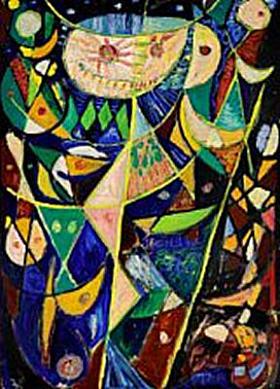
Mask composition
Egill Jacobsen
b. Dec. 16, 1910 Farvens sprog: the masks of Egill Jacobsen
Mark Mussari
Scandinavian Studies, Winter, 2004
_______________________
The Poem as Mask
by Muriel Rukeyser
Orpheus
When I wrote of the women in their dances and
wildness, it was a mask,
on their mountain, gold-hunting, singing, in orgy,
it was a mask; when I wrote of the god,
fragmented, exiled from himself, his life, the love gone
down with song,
it was myself, split open, unable to speak, in exile from
myself.
There is no mountain, there is no god, there is memory
of my torn life, myself split open in sleep, the rescued
child
beside me among the doctors, and a word
of rescue from the great eyes.
No more masks! No more mythologies!
Now, for the first time, the god lifts his hand,
the fragments join in me with their own music.
_______________________
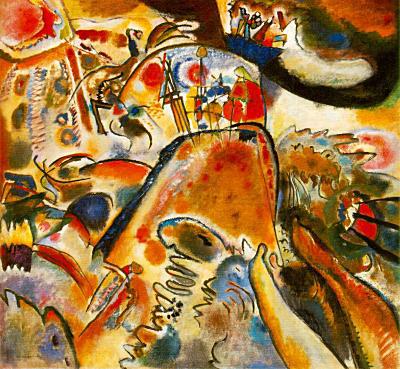
Small Pleasures
Wassily Kandinsky
b. Dec. 16, 1866
_______________________
Four poems from Das Auge des Entdeckers (The Discoverer’s Eye)
Nicolas Born
Translated by Eric Torgersen
Exquisite Corpse
On the Inside of Poems
You can't make a living
competing with reality
you can't live on reality either
you can survive an operation
and get everything back
and go on through Life
through quickly fading pictures
that was you
you and the One in the Oven
Persons panting under their tombstones--
With unspeakable exertion
by you and all your ancestors
you shield yourself
Land and water remain
the sky remains
and you remain
you have nothing to get ready for
little suns light your democracy And
you choose life and death
you have many Beautiful Voices
you are many
your skin is your skin And finally
nothing but skin
you're the entrepreneur of Life
impresario of white apparitions
you're the Spaceman out in the universe
the author of the course of history
...(more)
_______________________
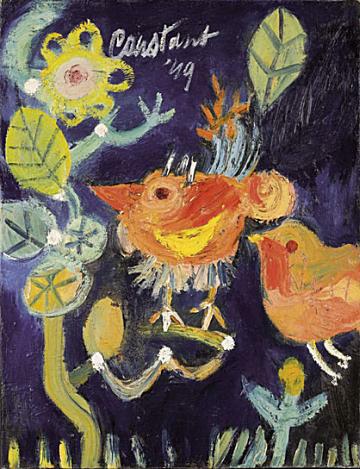
Constant Nieuwenhuys
1920 – 2005
_______________________
Betrayal: German Churches and the Holocaust
by Robert P. Ericksen
Review by Austin Cline
There was resistance and dissent among some Christians in Germany, but this was the exception rather than the rule — and too often, “resistance” was to efforts by the Nazis to exert greater control over church activities, not to the mass murder of non-Aryans. An important question asked in the book is, what religious beliefs caused a few to resist but the vast majority to simply go along with the Nazis' agenda? There is no simple answer to the question, but a consistent theme throughout all the factors appears to be the degree to which people accepted the blending of nationalism and Christianity, state and church.
People supported whatever the Nazis did because they believed that Adolf Hitler was a gift to the German people from God. They believed that True Christianity must include basic Aryan values, while true German-ness must exhibit Christian (as opposed to Jewish) values. They believed that support for the nation and Volk required supporting Christianity, while supporting Christianity meant supporting the nation and Volk. German theology was to be as fully Nazified as the Nazi party was Christianized. ...(more)
|
